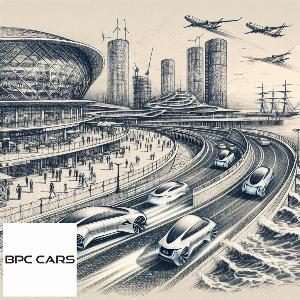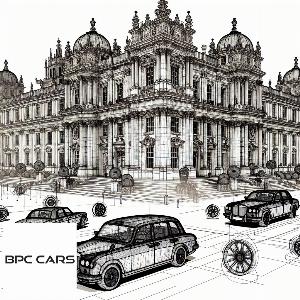Discovering Britain

History of British Clockmaking
The history of British clockmaking is a fascinating journey that dates back to the 14th century. Britain's iconic clockmakers, such as Thomas Tompion, known as the 'Father of English Clockmaking', and George Graham, have left an indelible mark on the world of horology. Their innovative designs and precision engineering set the standard for clockmaking worldwide. Today, their legacy can be explored in Britain's horology museums, such as the British Museum in London and the Museum of Timekeeping in Nottinghamshire. These museums house a vast collection of timepieces, from sundials and hourglasses to the most complex mechanical clocks. Travelling by transfer, visitors can easily navigate between these museums and other historical sites related to British clockmaking. This journey not only offers a glimpse into the evolution of timekeeping devices but also provides an insight into Britain's industrial history. So, hop in a transfer and embark on a journey to discover the rich history of British clockmaking.
Famous British Clockmakers
Discover the rich history of British horology by visiting iconic clockmakers and museums across the UK. Start your journey with a visit to the world-renowned John Harrison, the inventor of the marine chronometer. His work revolutionised navigation and greatly increased the safety of long-distance sea travel. Next, take a transfer to the British Museum in London to see the work of Thomas Tompion, often referred to as the 'Father of English Clockmaking'. His innovative designs and high-quality craftsmanship set the standard for British clockmaking. Don't miss the Science Museum's Clockmakers' Museum, which houses a unique collection of British clocks, watches, and sundials dating from the 15th century to the present day. Finally, visit the Royal Observatory in Greenwich, home to the world's prime meridian line and a must-see for any horology enthusiast. Discovering Britain's iconic clockmakers by transfer is a fascinating journey through time, showcasing the nation's rich horological heritage.
Iconic British Clocks
Discovering Britain's iconic clockmakers and horology museums is a fascinating journey into the heart of British history. One of the most iconic British clocks is the Big Ben, a symbol of London and the UK. This magnificent timepiece was designed by Augustus Pugin and has been keeping time since 1859. Another iconic clock is the Eastgate Clock in Chester, which is said to be the most photographed clock in England after Big Ben. The Salisbury Cathedral Clock, believed to be the oldest working clock in the world, is another must-see. To delve deeper into the world of British horology, visit the British Horological Institute Museum in Newark, which houses a vast collection of timepieces. The Science Museum in London also has an impressive collection of clocks and watches. Exploring these iconic British clocks and horology museums by transfer is a convenient and comfortable way to travel. It allows you to take in the sights at your own pace, making your journey through time an unforgettable experience.
Horology Museums in Britain
Discover the rich history of British horology by visiting the iconic clockmakers and horology museums in Britain. Start your journey at the British Museum in London, home to a vast collection of timepieces from around the world. Next, take a transfer to the Science Museum, where you can explore the Clockmakers' Museum, showcasing over 600 watches, 80 clocks, and a library of horological literature. Continue your journey to the Museum of the History of Science in Oxford, housing a collection of early astronomical clocks. Don't miss the Royal Observatory in Greenwich, where you can stand on the Prime Meridian Line, the official starting point for world time. Lastly, visit the National Museum of Scotland in Edinburgh, which boasts a collection of rare and ancient timepieces. Discovering Britain's iconic clockmakers and horology museums by transfer is a fascinating journey through time, offering a unique insight into the history and evolution of timekeeping.
transfer Tours in Britain
Discover the rich history of British horology with a unique transfer tour across Britain. This journey will take you through the iconic clockmakers' workshops and horology museums, showcasing Britain's timeless contribution to the world of timekeeping. Start your tour in London, visiting the British Museum's horology collection, then head to Greenwich to explore the Royal Observatory, home to the world's prime meridian. Your transfer will then whisk you away to the countryside, where you can visit the workshops of renowned clockmakers. In Birmingham, the Museum of the Jewellery Quarter offers a glimpse into the city's clockmaking heritage. Further north, the Museum of Timekeeping in Upton hosts a vast collection of timepieces. A transfer tour is an ideal way to discover these horological treasures at your own pace, with the added convenience of door-to-door service. Experience the ticking heart of Britain and its timeless fascination with horology through this unique transfer tour.
British Horological Institute
The British Horological Institute (BHI) is a treasure trove for anyone interested in the art and science of timekeeping. This iconic institution is a gateway to discovering Britain's illustrious clockmakers and horology museums. A transfer tour around the BHI and its affiliated museums offers a unique journey into the heart of British horology. The BHI, located in Upton, Nottinghamshire, houses an extensive collection of timepieces, from sundials to atomic clocks, showcasing the evolution of timekeeping. The institute also offers educational courses and workshops for those interested in horology. A transfer ride away, you can visit the Museum of Timekeeping, which houses a fascinating collection of clocks, watches, and horological tools. Another must-visit is the Clockmakers' Museum in London, home to an impressive collection of British clocks and watches. A transfer tour of these horological hotspots is a must for any timepiece enthusiast, offering a unique insight into Britain's rich clockmaking history.
Clockmaking Techniques
Embarking on a journey through Britain's rich horological history, one can discover the intricate clockmaking techniques of iconic British clockmakers and explore the country's renowned horology museums. A transfer tour offers a convenient and comfortable way to traverse this fascinating landscape. The British Museum in London houses a vast collection of timepieces, showcasing the evolution of clockmaking techniques over centuries. The Museum of the History of Science in Oxford is another must-visit, featuring a unique collection of early British clocks. A transfer ride to the countryside leads to the Clockmakers' Museum in Guildford, where one can delve into the world of British clockmaking. The museum is home to the works of eminent clockmakers like Thomas Tompion and George Graham. A visit to these museums provides a deep understanding of the craftsmanship and precision that goes into clockmaking. This transfer tour is a perfect blend of education and exploration for horology enthusiasts.
Impact of British Clockmaking
The British clockmaking industry has significantly contributed to the world of horology, birthing iconic clockmakers whose works are celebrated in various museums across Britain. These museums, accessible by transfer, offer a deep dive into the rich history and evolution of British clockmaking. The British Museum in London, for instance, houses a vast collection of timepieces, including works from renowned clockmakers like Thomas Tompion and George Graham. The Museum of the History of Science in Oxford also boasts an impressive collection of early British clocks. A transfer ride to the Clockmakers' Museum, nestled within the Science Museum, reveals the impact of the Worshipful Company of Clockmakers on British horology. The horology museums in Britain not only celebrate the artistry and craftsmanship of iconic clockmakers but also highlight the significant role of British clockmaking in the advancement of navigation, astronomy, and timekeeping. A transfer tour around these museums is a journey through time, tracing the footsteps of Britain's horological pioneers.
Our Latest Blog Posts

From London Airports: A Minicab Ride to Britain
Blog about From London Airports: A transfer Ride to Britain
Read MoreTaxi Trips To Britains Iconic Industrial Revolution Towns And Cities
Information about Taxi Trips To Britains Iconic Industrial Revolution Towns And Cities
Read More
From London Airports A Taxi Adventure To Britains Historic Seafront Promenades
Information about From London Airports A Taxi Adventure To Britains Historic Seafront Promenades
Read More
Exploring Britains Baroque Architecture And Estates By Taxi
Information about Exploring Britains Baroque Architecture And Estates By Taxi
Read More
From London Airports: A Minicab Adventure to Britain
Blog about From London Airports: A transfer Adventure to Britain
Read More
From London Airports: A Minicab Ride to Britain
Blog about From London Airports: A transfer Ride to Britain
Read More
Exploring Britains Traditional Cheese Making Regions By Taxi
Information about Exploring Britains Traditional Cheese Making Regions By Taxi
Read MoreBlogs Pages
A Taxi Trip Through Britain S Iconic Post War Architecture
Information about A Taxi Trip Through Britain S Iconic Post War Architecture...
Read MoreA Minicab Trip to Britain

Blog about A transfer Trip to Britain...
Read MoreMinicab Trips to Britain

Blog about transfer Trips to Britain...
Read MoreMinicab Tours of Britain

Blog about transfer Tours of Britain...
Read MoreMinicab Journeys to Britain

Blog about transfer Journeys to Britain...
Read MoreExploring Britain

Blog about Exploring Britain...
Read MoreUnderstanding Minicab Fares from Gatwick to Central London: A Comprehensive Guide

Blog about Understanding transfer Fares from Gatwick to Central London: A Comprehensive Guide...
Read MoreMinicab Journeys to Britain

Blog about transfer Journeys to Britain...
Read MoreA Minicab Trip to Britain

Blog about A transfer Trip to Britain...
Read MoreMinicab Tours of Britain

Blog about transfer Tours of Britain...
Read More